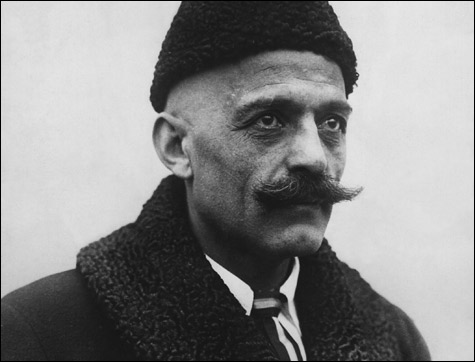
SHAMAN: The rogue was inextricable from the teacher, the quackery essential to the cosmology. |
The Arlington Hotel, Cambridge: March 6, 1924. His disciples must have shown him the newspapers, and we may imagine the guru perusing them over his morning coffee and cigarette, and then — through his haze of breakfast benignity — starting to rumble with colossally interiorized laughter. “GURDJIEFF RITES AMAZE BOSTON,” ran the front page of the Boston Post. “Wonderful Dances of Asia Set Before Audience of ‘Intellectuals’ Cause Thrills in Plenty.” Breathless description followed of an evening of ritual movements and telepathic demonstrations at the Fine Arts Theatre that was attended by the cream of the local professoriat and presided over by a wizardly figure with “shining shaved head, piercing eyes and upturned mustachios.” The story immediately above it on the Post’s front page, an unrelated account of a crooked horse-race tipster, was headlined “MASTER ROGUE IS AT IT AGAIN.”

Was Georges Ivanovitch Gurdjieff a charlatan? Plenty of people thought so, then as now. Edmund Wilson scorned him supremely; D.H. Lawrence thought him the perpetrator of “a sickly stunt.” To Frank Lloyd Wright, on the other hand, he was “the greatest man in the world.” And the writer Katherine Mansfield, who was dying of tuberculosis, delivered herself almost blissfully into his care. (Others since who have at one time or another claimed the influence of Gurdjieff’s work and writings include Alan Watts, Timothy Leary, Keith Jarrett, and Robert Fripp.) A minute in Gurdjieff’s presence sufficed to convince one that he had mastered something: the man reeked like garlic of strange powers and supernatural attainments. But the rogue in his personality was so inextricable from the teacher, the quackery so essential to the cosmology, that even his most devoted acolytes were kept in a sort of refined agony of doubt as to the nature of his intentions.
Gurdjieff, who died in 1949, was of Greek-Armenian descent and arcane provenance: his date of birth is unknown, he claimed to have spent his early years gathering knowledge in the caves and monasteries of the East, and he bore the scars of at least two bullet wounds on his body. His English was broken and rich in profanity. His system — the Fourth Way, or “The Work” — offered a comprehensive program for the breaking down and reassembly of the “human machine.” At his Institute for the Harmonious Development of Man, at Fontainebleau, in France, where aristocrats toiled in the scullery and intellectuals were sentenced to dig holes till their hands bled, he would from time to time shout “STOP!”, obliging everyone within earshot to freeze, mid action — the soil, as it were, still spilling from their lifted shovels. Arriving in Manhattan in January 1924 on the liner SS Paris, accompanied by 30 of his followers, Gurdjieff saluted the waiting photographers with an ironic tip of his astrakhan hat. “Comes To Save America,” ran the caption in the New York Times, equally ironic.
Basta Records has released a lovingly curated package called Oriental Suite containing four CDs plus a large and beautiful hardcover book. The book is a historical treasure trove, and the discs represent a feat of reconstruction: here for the first time, performed by Holland’s Metropole Orchestra with conductor Jan Stulen, is the strange and stately music that audiences at the 1924 demonstrations would have heard as an accompaniment to the dancing. Gurdjieff wrote the music with Thomas de Hartmann, a Russian composer who was also one of his most faithful pupils: Gurdjieff would “dictate” a melody — by whistling, humming or tapping out a rhythm or a few one-handed notes on the piano — and Hartmann would provide the orchestral setting.
The melodies came from way down in the Gurdjieffian memory banks, from his childhood and his wandering youth: dervish hymns, sacred dances, Caucasian folk songs, peasant riffs and prayers. Reclaiming this ancient, unrecorded musical language was part of the modernist project: in 1906 Béla Bartók had gone roaming in Transdanubia, transcribing more than three hundred folk songs. But Gurdjieff’s purpose ran deeper than ethnomusicology. When linked to the Sacred Movements he had devised for his troupe of dancers, the music on Oriental Suite was an exercise in mystical discipline. “The movements of which these dances consist,” explained one of his handouts, “have a double purpose: they express and contain a certain knowledge, and at the same time, they serve as a method of attaining a harmonious state of being.” Katherine Mansfield, after watching a rehearsal of the dance The Initiation of the Priestess, wrote to a friend, “It contains the whole life of a woman — but everything! Nothing is left out. It taught me, it gave me more of woman’s life than any book or poem.”